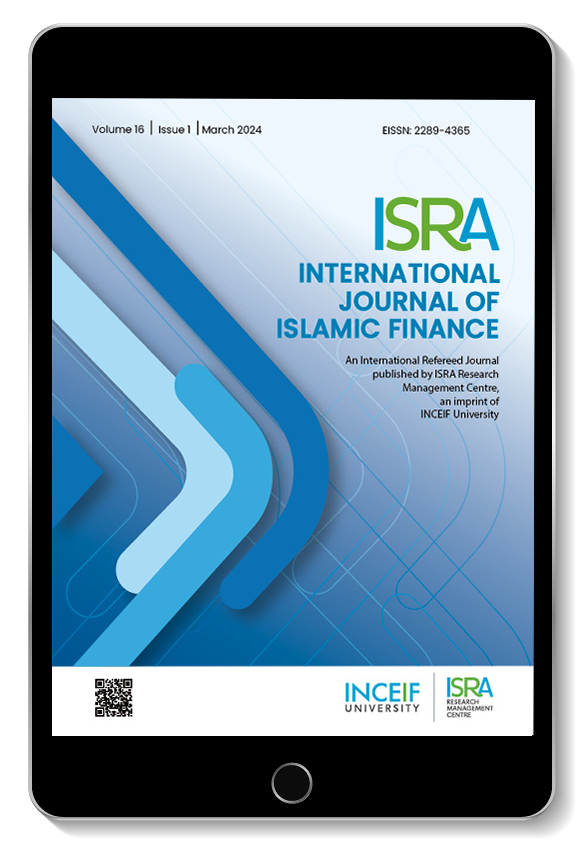Attitude, Subjective Norm, Perceived Behavioural Control and Digital Ṣukūk Adoption in Nigeria: The Mediating Effect of Awareness
IF 2.8
Q2 BUSINESS, FINANCE
引用次数: 0
Abstract
Purpose ‒ There is an increasing number of digital ṣukūk issuances worldwide but the level of awareness and adoption in Nigeria is very low. This research examines the mediating effect of awareness on the relationship between attitude, subjective norm, perceived behavioural control and digital ṣukūk adoption in Nigeria. Design/Methodology/Approach ‒ The data for the research were collected from 750 questionnaires that were distributed using the systematic sampling technique to operators of the capital market and individuals in Nigeria, out of which 410 were retained. The partial least squares structural equation modelling (PLS–SEM) algorithm was used for the reliability measurement and constructs validity while the bootstrapping technique was used for testing the study hypotheses. Findings ‒ The findings reveal that awareness mediated the relationship that exists between subjective norm, attitude, perceived behavioural control, and digital ṣukūk adoption in Nigeria. Overall, the empirical findings rejected seven out of 10 null hypotheses developed to answer the research questions. Originality/Value ‒ The study serves as a pioneering effort towards unlocking the viability of digital ṣukūk adoption amongst the Nigerian populace. Research Limitations/Implications ‒ The findings provide empirical evidence that awareness mediated the interrelationship between the explanatory variables (subjective norm, attitude and perceived behavioural control) towards digital ṣukūk adoption in Nigeria. Practical Implications ‒ The findings suggest the need for the Debt Management Office (DMO) in partnership with the Central Bank of Nigeria (CBN) to facilitate the required regulation and standard pertaining to digital ṣukūk issuances and structures. Article Classification ‒ Research paper态度、主观规范、感知行为控制与尼日利亚数字Ṣukūk采用:意识的中介作用
目的-全球范围内的数字ṣukūk发行数量不断增加,但尼日利亚的意识和采用水平非常低。本研究考察了意识对尼日利亚态度、主观规范、感知行为控制和数字ṣukūk采用之间关系的中介作用。设计/方法/方法-研究数据从750份问卷中收集,这些问卷使用系统抽样技术分发给尼日利亚资本市场运营商和个人,其中410份被保留。采用偏最小二乘结构方程建模(PLS-SEM)算法进行信度测量和效度构建,采用自举技术对研究假设进行检验。研究结果-研究结果表明,在尼日利亚,意识介导了主观规范、态度、感知行为控制和数字ṣukūk采用之间的关系。总的来说,实证研究结果拒绝了十个零假设中的七个,这些假设是为了回答研究问题而提出的。原创性/价值-这项研究是一项开创性的努力,旨在解锁尼日利亚民众采用ṣukūk数字技术的可行性。研究局限性/影响-研究结果提供了经验证据,表明意识介导了尼日利亚数字ṣukūk采用的解释变量(主观规范、态度和感知行为控制)之间的相互关系。实际影响-调查结果表明,债务管理办公室(DMO)需要与尼日利亚中央银行(CBN)合作,以促进与数字ṣukūk发行和结构相关的所需监管和标准。文章分类-研究论文
本文章由计算机程序翻译,如有差异,请以英文原文为准。
求助全文
约1分钟内获得全文
求助全文
来源期刊

ISRA International Journal of Islamic Finance
BUSINESS, FINANCE-
CiteScore
3.40
自引率
17.40%
发文量
18
审稿时长
20 weeks
期刊介绍:
It is the aspiration of the editorial committee that IJIF achieves the highest rank in quality and substance. It is thus our aim that the journal be carried in the Thompson Reuters’ ISI and Scopus databases. By ensuring high standards in articles published in Islamic finance we ensure that further innovation and research is carried out and promoted in the Islamic finance industry and academia. IJIF publishes 2 issues per annum.
 求助内容:
求助内容: 应助结果提醒方式:
应助结果提醒方式:


